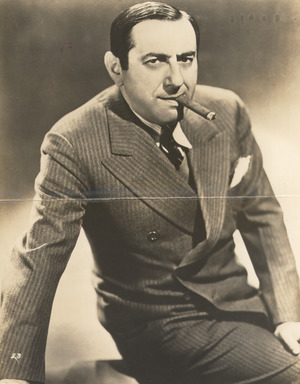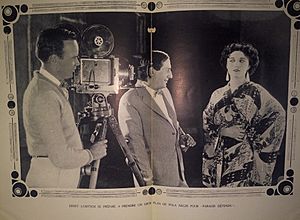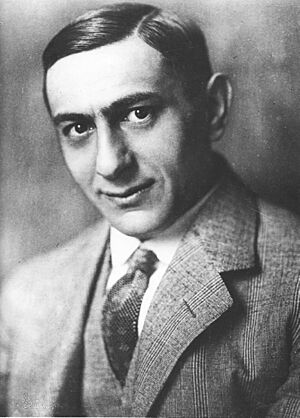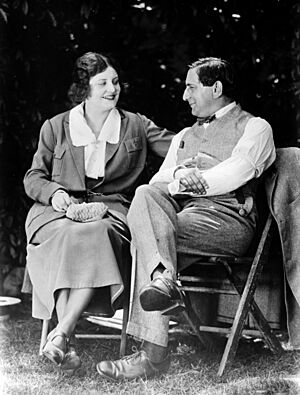Ernst Lubitsch facts for kids
Quick facts for kids
Ernst Lubitsch
|
|
|---|---|
 |
|
| Born | January 29, 1892 |
| Died | November 30, 1947 (aged 55) Los Angeles, California, U.S.
|
| Resting place | Forest Lawn Memorial Park (Glendale) |
| Occupation |
|
| Years active | 1913–1947 |
| Spouse(s) |
Helene Kraus
(m. 1922; div. 1930)Vivian Gaye
(m. 1935; div. 1944) |
| Children | 1 |
Ernst Lubitsch (born January 29, 1892 – died November 30, 1947) was a famous German-American film director, producer, writer, and actor. He was known for his smart and funny movies, especially comedies about how people act in society. His films were so special that people called his unique style "the Lubitsch touch".
Some of his most well-known movies include Trouble in Paradise (1932), Ninotchka (1939), and The Shop Around the Corner (1940). He was nominated three times for the Academy Award for Best Director. In 1946, he received a special Honorary Academy Award for his amazing work in movies.
Contents
Ernst Lubitsch's Early Life
Ernst Lubitsch was born in 1892 in Berlin, Germany. His father, Simon Lubitsch, was a tailor. His family was Jewish. His father came from Grodno, which is now in Belarus. His mother was from a town near Berlin.
Ernst decided not to follow his father's tailoring business. Instead, he wanted to work in theater. By 1911, he was part of the Deutsches Theater in Berlin, a famous theater group.
Lubitsch's Film Career
Starting in Film (1913–1921)
In 1913, Lubitsch first appeared in a film as an actor. The movie was called The Ideal Wife. Over time, he started directing more and acting less. He acted in about 30 films between 1912 and 1920. His last acting role was in the 1920 drama Sumurun, which he also directed.
In 1918, he became known as a serious director with Die Augen der Mumie Ma (The Eyes of the Mummy). He made both funny comedies and big historical dramas. He became very famous around the world. His movies Madame Du Barry (1919) and Anna Boleyn (1920) were huge successes. These films, along with his movie Carmen (1918), were chosen by The New York Times as some of the most important movies of 1921.
Because of his success, Lubitsch started his own film company. He made a big movie called The Loves of Pharaoh (1921). In December 1921, Lubitsch traveled to the United States. He wanted to promote his film and learn about the American film industry. But after World War I, some American movie workers were not happy about German filmmakers coming to the U.S. Lubitsch cut his trip short. However, he saw that the American film industry had many more resources than German companies.
Moving to Hollywood (1922–1927)

Lubitsch moved to Hollywood in 1922. He was hired by the famous actress Mary Pickford to direct her film Rosita. The movie was popular, but Lubitsch and Pickford did not get along. This was the only movie they made together.
After Rosita, Lubitsch signed a special contract with Warner Brothers. This contract let him choose his actors and crew. It also gave him full control over the final movie. He became known for his smart comedies like The Marriage Circle (1924) and Lady Windermere's Fan (1925). These films were not very profitable for Warner Brothers. So, his contract ended, and he moved to other studios like Metro-Goldwyn-Mayer (MGM) and Paramount. His film The Patriot (1928) earned him his first Academy Award nomination for Best Director.
Sound Films and "The Lubitsch Touch" (1928–1940)
When sound came to movies, Lubitsch started directing musicals. His first sound film was The Love Parade (1929). It starred Maurice Chevalier and Jeanette MacDonald. This movie helped him become a master of musical comedies. The Love Parade, Monte Carlo (1930), and The Smiling Lieutenant (1931) were praised by critics.
His next film was a romantic comedy called Trouble in Paradise (1932). This movie was popular with both critics and audiences. However, rules about what could be shown in movies changed after 1935. Because of these new rules, Trouble in Paradise was not shown again until 1968.
Lubitsch continued to make comedies, often with music. These included The Merry Widow (1934) and Design for Living (1933). He made only one drama during this time, an anti-war film called Broken Lullaby (1932).
In 1935, Lubitsch became a production manager at Paramount Pictures. This meant he was in charge of making many films. He was the only major Hollywood director to run a big studio. He produced his own films and oversaw others. But he found it hard to let others make decisions. He was fired after a year and went back to directing full-time. In 1936, he became a citizen of the United States.
On July 27, 1935, he married British actress Vivian Gaye. They had a daughter, Nicola Anne Patricia Lubitsch, on October 27, 1938. In 1939, Vivian and Nicola were in London when World War II began. Vivian sent their baby daughter and her nursemaid back to America on a ship. The ship was attacked, but Nicola and her nurse survived.
In 1939, Lubitsch moved to MGM. He directed Greta Garbo in Ninotchka. Garbo was known for being very serious. The movie was a comedy, and the studio used the tagline "Garbo Laughs!" to promote it.
In 1940, he directed The Shop Around the Corner. This clever comedy starred James Stewart and Margaret Sullavan. They played co-workers in Budapest who argued but were secretly writing romantic letters to each other.
Later Films and Legacy (1941–1947)
Lubitsch next directed That Uncertain Feeling (1941). This movie was not a big success. Then he made To Be or Not to Be. This film was a witty and dark comedy about actors in Nazi-occupied Poland.
He spent the rest of his career at 20th Century Fox. A heart condition limited his work, so he spent more time supervising other films. His next movie was Heaven Can Wait (1943). This was his first color film. It tells the story of a man looking back at his life and his marriage.
After Heaven Can Wait, Lubitsch started A Royal Scandal (1945). This was a remake of his silent film Forbidden Paradise. He became ill during filming, so Otto Preminger finished the movie. After recovering, Lubitsch directed Cluny Brown (1946).
In March 1947, Lubitsch received a Special Academy Award. It was for his "25-year contribution to motion pictures." The presenter called him "a master of innuendo." Lubitsch often said that The Shop Around the Corner was his favorite film.
Death and Lasting Impact
Ernst Lubitsch died from a heart attack on November 30, 1947, in Hollywood. He was 55 years old. His last film, That Lady in Ermine, was finished by Otto Preminger and released after his death.
After his funeral, director William Wyler said, "No more Lubitsch." Billy Wilder, another famous director, replied, "Worse than that. No more Lubitsch pictures." Lubitsch is buried at Forest Lawn Memorial Park. In 1960, he received a star on the Hollywood Walk of Fame for his contributions to movies.
Lubitsch's Awards and Legacy
In 1946, Ernst Lubitsch received an Honorary Academy Award for his important work in movies. He was also nominated three times for Best Director.
A German comedy award, the Ernst-Lubitsch-Prize, was created in 1958. This was done by Billy Wilder to remember his friend.
Filmography
Images for kids
See also
 In Spanish: Ernst Lubitsch para niños
In Spanish: Ernst Lubitsch para niños
 | Bessie Coleman |
 | Spann Watson |
 | Jill E. Brown |
 | Sherman W. White |







